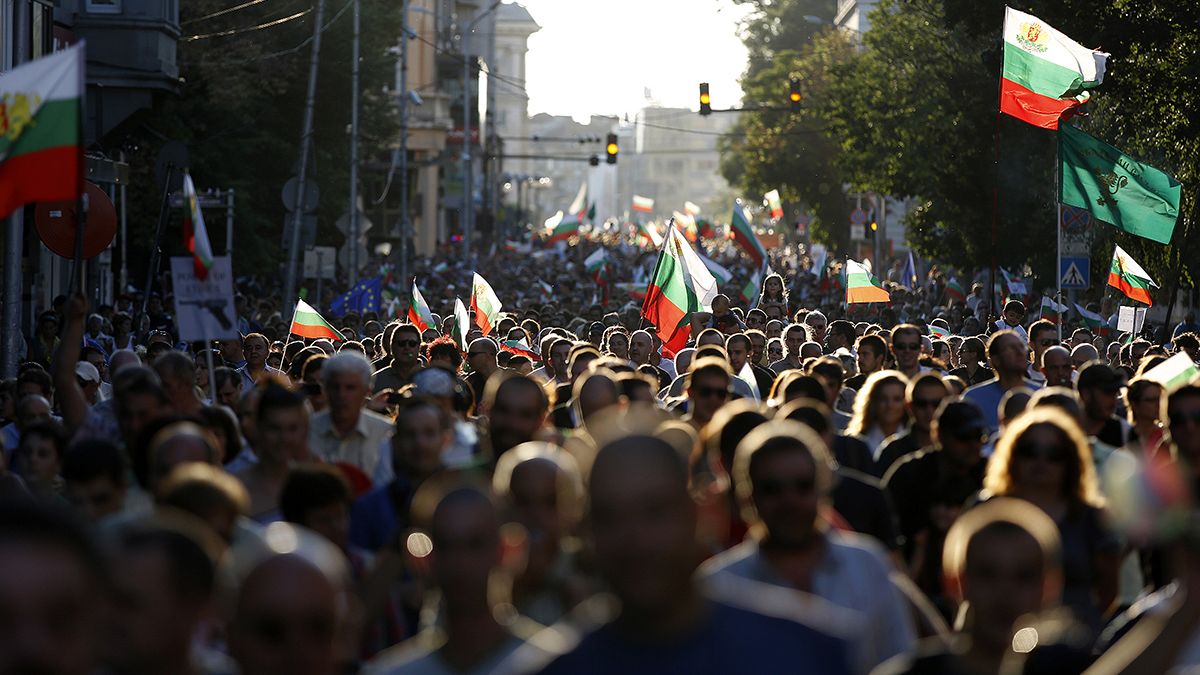It’s been three weeks. Determined anti-government protests rock the Bulgarian capital Sofia for the second time this year. Thousands of young professional men and women – conspicuously silent during the difficult years before – gather every day in front of the National Assembly, still bearing the poignant motto “Union makes strength” above its tomato-splattered door.
They are here to express their outrage at the collusion of state and organized crime, at the brazen brutality with which the current vexed coalition government headed by Plamen Oresharski (and, in fairness, those before it) attempted to vote in monopoly-enabling laws and shelter known criminals from prosecution. For many of these protesters, Bulgaria is back to square one – exactly where it was 23 years ago, emerging from decades of Communist rule with a completely compromised political system and a humiliating poverty rating. This may well be true, and here’s why:
The democratic changes in Bulgaria, as part of the East European awakening of the early 90s, were preceded by 45 years of Communist rule, which effectively eradicated any traces of a free and functional political culture on a citizen level. Elections were staged; government was everywhere, listening to your very thoughts. Government was, in effect, the enemy. Bulgarians welcomed the 21st century believing in the very impossibility of good, honest governance.
Moreover, the nation didn’t crash into Communism with a positive experience of statehood. Bulgarian culture is, if anything, largely stateless – Bulgarians formed as a nation under the Ottoman Empire – for obvious reasons the state represented something you largely hid from, circumnavigated and/or outright resented. Bulgarian identity was practically established in opposition of official, lawful powers. In the aftermath of yet another Russo-Turkish war in 1878 Bulgarians were liberated and had to form a state after 500 years of no political representation. Elites had to be more or less artificially constructed. Kings were simply imported from the small German nobility, struggling with something as basic as the language for decades.
Bulgarians, in turn, struggled with the idea of genuine representation and the concept of elections. And never really got it right – comparing chronicles of pre-election vote buy-outs and mass intimidation from the 1880s and news reports from this year’s snap elections will show chilling similarities.
For ordinary Bulgarians, the state continued to be a foreign body, an intruder into a very local, privatized view of human existence. The first part of the 20th century was marked by five ruinous wars (including WWI and WWII) that didn’t do anything to bolster the faith of Bulgarians in political leadership, at least in terms of its concern with the actual population. In the 40s, huge parts of Bulgaria were still largely without electricity and modern plumbing. Subsistence farming and tuberculosis were the everyday realities of most rural communities.
And these were the people who felt oppressed and welcomed the Communist coup of 1944. They were promised free healthcare and education, running water and enough food. They got these things. But they also got the USSR directing the Bulgarian government’s every move. Again, the idea that you cannot meaningfully influence anything but your immediate family’s welfare was firmly reinforced in Bulgarian public culture.
Then the Berlin Wall fell. And suddenly, Bulgaria had a new host of foreign powers to please – NATO, the European Union, the International Monetary Fund. All meaningful political power seemed ultimately derived from somewhere else, far above, far beyond the embattled, desperately maintained conceptual borders of Bulgarian identity. An identity based on the perception that statehood is ultimately a foreign, superimposed entity that besieges a community of tacit endurance.
Well, in the year 2013, the tacit endurance seems to have finally been exhausted. Bulgarians are on the street, sneering, contemptuous, quietly, yet articulately angry at their entire political class, ready to defy any and all governments, it seems. They toppled one in February, and then voted the same party back in Parliament not two months later, now they demand the resignation of a coalition government that is not yet three months old.
Is the centuries-old allergy towards governance finally acting up? Is the entire state structure in Bulgaria delegitimized beyond salvage? At the moment, many Bulgarians, sipping “protest coffee” each morning in front of a bored-looking police cordon and making fun of any MP who dares to peer out behind the heavy curtains of Parliament will tell you: “Just so.”
Maria Spirova
Maria Spirova is an award-winning Bulgarian journalist with over 10 years of agency and long-form experience.
